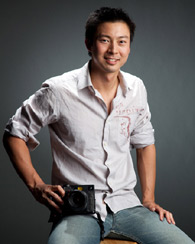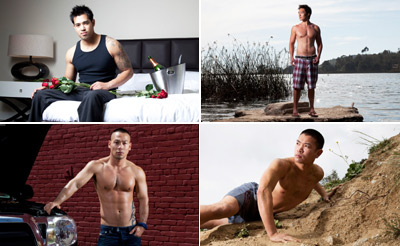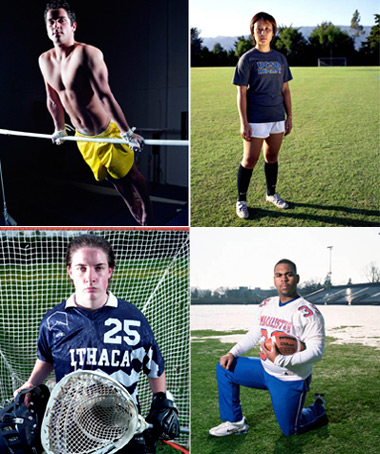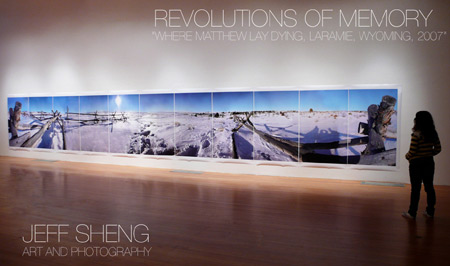Jeff Sheng's latest project the 2010 Asian Pacific Male Calendar (available on Fridae Shop) is a fundraising project to benefit the Asian Pacific Health Care Venture - a non-profit community health center in Los Angeles that provides low cost medicine to the working poor and uninsured.

The LA-based photographer speaks to Fridae about his other aim of the calendar and his ongoing Fearless photographic project about “out” high school and collegiate athletes in the US and Canada which will be exhibited at the 2010 Winter Olympics in Vancouver, and a new project about US servicemen and women affected by the Don't Ask, Don't Tell policy.
æ: Tell us more about the calendar. Aside from fundraising for the Asian Pacific Health Care Venture (APHCV) in Los Angeles, a non-profit organisation providing health care assistance to working poor and under-served Asian and Pacific Islanders, what else do you hope to achieve with that?
Jeff: First and foremost, I am incredibly honored that all the profits go to this charity. I had a chance to visit their facilities and meet their staff a few months ago during the first launch of the calendar, and I was just very moved that a center like this existed and that our work was going to benefit them. APHCV is a healthcare center based in Los Angeles, and they serve a large number of low income Asian Pacific Islander individuals of all ages in Southern California, who are not able to afford the high cost of health care and prescriptions that have become emblematic of the current health care system in the United States. I was surprised by how large the place is and how many people were there that day who needed their services. The staff was kind, generous, and I could tell just on my first visit, that the center was a very unique and special part of the local API community in Los Angeles, the city where my studio is now based and where I personally grew up. Finding a way to give back to your community is something I encourage all artists to try and do.
The second thing I hope to achieve with the calendar is to create a project and set of images of Asian men, that surprise people and break many of the stereotypes Western society have with Asian men. I also wanted to do this in a way that didn't privilege one body type over another, and the part of my photography and production of the calendar that I am most proud of is its incredible diversity.
In casting the calendar, we not only wanted a range of Asian ethnicities, but also different body types, professions, socio-economic backgrounds, and even sexual orientations. We wanted a range of Asian American men, and the final product wonderfully embodies this. There are men who ethically identify from almost every East and Southeast Asian country: Cambodia, Vietnam, Thailand, China, Korea, Taiwan, Japan; our models come from many different professions such as actors, lawyers, the armed forces, and filmmakers, and while most of the models identity as straight, there are a few that proudly do not. There is also a wide range of body types, from more slender and trim, to a few hunky beefcake type of guys.

My favorite misguided negative comment about the calendar so far has been when people say, "I hate how they had to find all these half Asian guys for the calendar." What I find fascinating about this comment is only one of our models identifies as half-Asian – the rest of the models are actually full Asian. I think what happens is that when viewers see photographs of "Asian men" that show a high degree of so-called masculinity, confidence, sexiness, and attractiveness, there is an assumption made that "they must be part white" because "a full Asian can't look this way in a photograph."
This is the part of the project that I love: how my production team and I have been able to shatter these assumptions with guys that in all honesty, were not cast because "they looked white" but because they were simply attractive. And by placing them in photographs that we are just accustomed to only seeing another type of ethnicity in, our own assumptions about what "Asian" looks like is challenged.
æ: You were quoted as saying that one of the aims of it is to "increase the visibility of Asian American men in a society that disproportionally focuses on 'white' beauty and Asian American women" and to "combat the lack and invisibility of strong, good-looking Asian male imagery out there in American culture." This seems to be an overarching issue for many, many years. Do you think there have been marked improvements in the last 10 or 20 years or do you think that "change" is happening at too slow a pace?
Jeff: Yes, things are too slow, but as an impatient workaholic, I think everything happens at too slow of a pace. :) There have been improvements, but I still don't see Asian American men cast in so-called leading roles and serving as major sex symbols. We are still looking for our Denzel Washington and Antonio Banderas.
Change happens when society asks for change, creates change, and then accepts change. The experience of making this calendar has shown me that there is incredible momentum of people asking for change: "Please make a project that shows Asian American men in a different way." We made a product, and now comes the moment to see how many people in Western society accept and embrace what we have done.
æ: How do you describe your racial/ethnic heritage? Did you grow up in the US and if so, what thoughts did you have growing up as a young Asian man and did you always want to comment through your work on the issues that affected you personally?
Jeff: I first and foremost identify as Asian American, as I was born in California, and as I grew up, did not separate my Asian American friends along ethnic lines as I found that as a whole, we were lumped into one category by my mostly white peers: Asian. As I got older, I began to become more interested in my Chinese and Taiwanese heritage (I am ethnically both and find myself conflicted in what that means politically). I now teach in the Asian American studies department at the University of California, Santa Barbara, and it's important for my students to learn what it means to be both part of their ethnic group(s) and also how that fits into the larger context of being Asian in Western society.
The one attribute that my high school teachers noticed most about me was my ability to both incredibly quiet and retrospective at select times, but then suddenly at the next moment, to be incredibly loud and passionate about what I believed in. When I spoke out about something, particularly when I felt there was injustice about an issue, I made sure that I was informed about what I said, and people listened. They thought I was going to become a civil rights attorney as I could both carefully listen and observe, and then powerfully articulate and advocate for others.
æ: You have a BA from Havard in filmmaking and photography. How did you get into photography and why did you decide to study it formally?
Jeff: I took a photography class as an elective my freshman year, and I began to see the immense power that photography, art and filmmaking could have on people – a way you could argue something that words could never fully do. I also looked at my classmates at Harvard, many of them pre-law students, and realised our world already had too many lawyers, and that I could affect change in society in a way that was different. It was also very encouraging that my professors thought I was talented in photography (though I always wonder what the value of "talent" really means as I think I'm much more of a hard worker that someone who is talented).
æ: How were the 12 models found and selected? Were there any particular attributes you were looking for?
Jeff: My producer put out a call for Asian American male models and we did two open castings in my studio in Los Angeles. We had over 40 submissions. I did a few test shoots of each model, specifically looking at the comfortability each model had in front of a camera. I then sat down with my producer and designer for the project going over the photographs I had shot, and we worked on piecing together a diverse group of individuals that we thought would represent many different ethnicities and body types, while still being attractive individuals – and we made our selections of models.

æ: I hear that you've been invited to exhibit and speak about Fearless at the 2010 Winter Olympics in Vancouver. What's Fearless about and how did you conceptualise the project?
Jeff: Fearless is my photo project that I've been working on since 2003 about high school and college athletes who also openly identify as lesbian, gay, bisexual or trans, and are out to their teammates and coaches, and still actively compete on their school sports. I was a former competitive junior athlete in tennis, and was not out to my high school team, and when I came out in college, quit playing scholastic sports. The project now has almost 100 athletes, and will be published into a large book next year in 2010, and has now been exhibited at over 40 venues including the headquarters of ESPN in the United States, and as you mentioned, will be part of the arts and culture programming for the 2010 Winter Olympics. I was also awarded a grant by a foundation based in Vancouver, Canada, to expand Fearless to athletes in Canada, and I am currently working on potentially having the project exhibited as part of the London Games in 2012. You can see that project at www.FearlessCampusTour.org and see both images from the project, and also installation shots from many of the past exhibitions, many of which are at high schools and colleges in the United States.
æ: What inspired your latest project Don't Ask, Don't Tell?
Jeff: I have always been interested in doing something related to Don't Ask, Don't Tell, but was always too busy with Fearless. I also figured that another photographer was going to do a project related to Don't Ask, Don't Tell, and/or President Obama was going to repeal the policy. It's almost 2010 and neither one has happened, so I guess it's a sign that I should take this on. Also, while working on Fearless, I had a few inquiries from closeted U.S. service members as to whether or not I had considered working on DADT, and yes is my answer, and I'm finally working on it wholeheartedly.
By the way, it's a ton of work to do multiple projects at once. I'll be in Vancouver, Canada for the next three days, working on photoshoots of eight different athletes for the Canadian portion of Fearless, and then last week I was in the midwestern part of the United States working on two photoshoots for Don't Ask, Don't Tell, while also stopping in Boston for a day to photograph a trans-identified Olympic level college athlete for Fearless. I've spent over 30 hours on an airplane in just the last 10 days.

æ: What other projects are in the works?
Jeff: My project Revolutions of Memory is my most significant body of work, and I'm hoping to finish that in a few years after Fearless is completed. This is a series of panoramic images I create that deal with trauma, history, memory, celebration and death. I'm incredibly proud of my piece, "Where Matthew Lay Dying," a large 40 ft. long panoramic taken from the vantage point and perspective of where Matthew Shepard was left to die in Laramie, Wyoming, and I'm hoping to show this work in a solo exhibition in Los Angeles next year.
æ: You were in college when he was murdered in 1998, when and what motivated you to go to Laramie?
Jeff: I shot the image in January of 2007, and slowly pieced it together over the next few months. The final image is from about 50 different 35mm snapshots taken from the supposed place where his body was found in Laramie, Wyoming. I was actually a college freshman at the time when he was murdered in 1998, and the idea that we were roughly the same age really struck a nerve in my psyche, both at the time of the incident and while I was taking the photograph. As a person of color and someone who is not straight, I have always been highly attuned to the idea of hate crimes – Vincent Chin comes to mind for my Asian American identity. [Chin was a Chinese American who was beaten to death in a racially motivated attack in 1982.]
While I was at the site where Matthew Shepard was found, I first started taking pictures directly of the fence post when I suddenly realised that I was taking the picture from the vantage point of the killers... looking down at the site. I felt wrong somehow in continuing this tradition of looking at the fence post in this manner, so I sat in the spot where he was found to reverse the vantage point, and to give the power of perspective to the victim. The final result is from his fictional vantage point... a perspective we never see.
æ: What is your vision for the gay community?
Jeff: Complete equality, whatever that means.
æ: What's your biggest guilty pleasure?
Jeff: Watching Law and Order, Criminal Intent, reruns while cuddling with my dog on my couch at home.
æ: Tell us one of your fantasies?
Jeff: It involves traveling the world with someone for half a year, and not getting into any arguments with them.
æ: Who would your dream date be if you were straight for a day?
Jeff: Michelle Obama





























 列印版本
列印版本












讀者回應
Great work, Jeff! Thanks fridae and Sylvia for the article.
You gotta Jeff Sheng and his work on your show before you quit!!
America needs to hear his VOICE.
Blessings on your lens...
Kudoes to all involved.
While I applaud Jeff's generosity in donating all the profits to this health charity, I think a better way to manage healthcare costs is to prevent disease in the first place. Just as it's more economical to prevent and screen for HIV before one is infected than it is to treat it after one's condition advances to AIDS, it's always better to put our dollars on preventive measures.
Examples would be helping the poor obtain basic health screening (inclusive of HIV antibody test) regularly at a subsidised rate, counselling them how to avert a potentially serious condition such as hypertension, diabetes and HIV (if they have other STDs it may be a sign they hadn't been practicing safer sex, and may become infected with HIV if they continue with their habit). Perhaps there should be a monthly instalment scheme which allows the poor to fork out just 10-30 bucks a month to obtain an annual subsidised health screening. The subsidised portion would come from donations.
In fact, with many common and affordable home test-kits or lab tests, the precursors of many serious diseases (such as heart disease, diabetes, major cancer and AIDS) could be detected and cured effectively at at early stage. The problem faced by the poor is a vicious cycle originating from their tight budget which causes them to cut back on essential regular health tests. Consequently, unaware of the silent precursors, they wouldn't take important steps to avert their condition. And that's how they end up suffering from the serious diseases themselves most of the time.
And you'll be first in line.
this is a great project, let a thousand flowers bloom with other variations. thanks Jeff for your leadership!
請先登入再使用此功能。